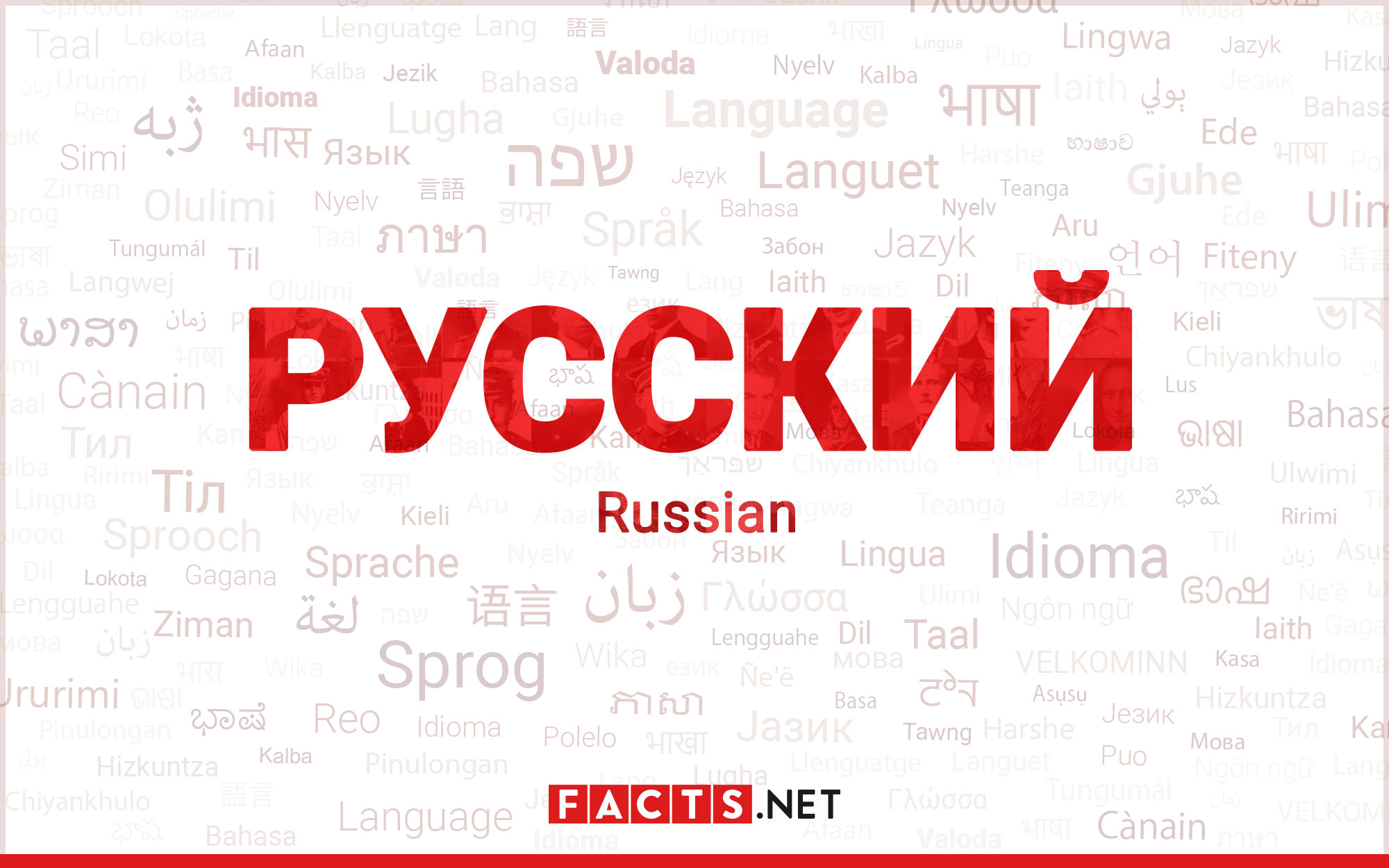
Russian, with its rich history and widespread usage, is truly a captivating language. Whether you’re a language enthusiast or simply curious about different cultures, exploring the ins and outs of the Russian language can be a fascinating journey. From its Cyrillic alphabet to its complex grammar structure, Russian offers a unique and immersive linguistic experience. In this article, we will dive into 18 captivating facts about Russian that will not only give you a glimpse into the language itself, but also provide insights into Russian culture, heritage, and its global influence. So, grab a cup of tea or a shot of vodka, and let’s embark on this linguistic adventure through the enchanting world of Russian!
Key Takeaways:
- Russian is the eighth most widely spoken language on the internet, showing its importance in the digital world and making it a valuable language to learn for online communication.
- Russian has a rich literary tradition with renowned authors like Leo Tolstoy and Fyodor Dostoevsky, offering a fascinating world of stories and insights waiting to be explored.
Russian is one of the six official languages of the United Nations.
With its widespread use and influence, Russian holds an esteemed position on the global stage. It is among the official languages of various international organizations, including the United Nations, UNESCO, and the International Atomic Energy Agency.
Russian is an Eastern Slavic language.
As part of the Slavic language family, Russian is closely related to other Eastern Slavic languages such as Ukrainian and Belarusian. These languages share similar grammatical structures and vocabulary, making it easier for speakers of one language to understand and learn the others.
Russian has more than 250 million speakers worldwide.
Spread across Russia, Ukraine, Belarus, and other countries with significant Russian-speaking populations, the language has become one of the most widely spoken in the world. Additionally, it is estimated that around 30% of web content is available in Russian, highlighting its importance in the digital age.
The Russian alphabet is based on the Cyrillic script.
Unlike languages that use the Latin script, such as English or Spanish, Russian utilizes the Cyrillic script. Developed in the 9th century by the Byzantine missionaries Cyril and Methodius, this script consists of 33 letters and has been adapted to write various Slavic, Turkic, and Mongolic languages.
Russian has six cases.
Russian grammar can be complex, with six grammatical cases – nominative, genitive, dative, accusative, instrumental, and prepositional. Each case has its own specific usage and impacts the form of nouns, adjectives, pronouns, and verbs in a sentence.
The Russian language has a rich literary tradition.
Renowned authors such as Leo Tolstoy, Fyodor Dostoevsky, and Anton Chekhov have contributed to the rich literary heritage of the Russian language. Their works, including “War and Peace,” “Crime and Punishment,” and “The Cherry Orchard,” have had a profound impact on world literature.
Russian has a complex system of verb aspect.
Verbs in Russian can have two aspects – perfective and imperfective. The aspect indicates whether an action is complete or ongoing, greatly impacting the meaning of a sentence. Mastering the correct use of verb aspect is essential for fluent communication in Russian.
Russian has a unique way of counting.
The Russian language employs different grammatical rules when counting objects, depending on the numerical value. There are specific forms for one, two to four, and five and above. This unique counting system adds an interesting aspect to the language.
Russian has distinct stress patterns.
Stress patterns in Russian can be quite challenging for non-native speakers. The stress placement can change the meaning of words, and there are no fixed rules governing stress in the language. Accurate stress placement is crucial for proper pronunciation and comprehension.
Russian has a vast number of words for different shades of blue.
While English has a limited number of words for different shades of blue, Russian boasts multiple specific words for each variation. From “goluboy” (light blue) to “siniy” (dark blue), the language reflects a keen cultural sensitivity to color nuances.
Russian uses the Cyrillic script for emoji too.
In the digital age, emojis have become a popular means of communication. Interestingly, Russian employs the Cyrillic script for its emoji counterparts, ensuring a consistent and recognizable representation of emotions in text messages and online conversations.
Russian has widely adopted loanwords from various languages.
Over the centuries, Russian has incorporated loanwords from diverse languages, including French, German, English, and Arabic. These borrowed words have enriched the Russian vocabulary and reflect the language’s capacity for adaptation and integration.
Russian has a formal and informal form of “you.”
In Russian, there are distinct formal and informal forms of the second-person pronoun “you.” This distinction allows speakers to convey politeness and respect when interacting with others, reflecting the importance placed on social hierarchies and interpersonal relationships.
Russian is known for its tongue twisters.
With its intricate phonetics and consonant clusters, Russian is famous for its challenging tongue twisters. These playful phrases test the agility of one’s tongue and provide entertainment while honing pronunciation skills.
Russian has a rich tradition of folk tales.
Russian folklore is filled with captivating tales of mystical creatures, brave heroes, and enchanting adventures. These stories, passed down through generations, continue to inspire and entertain both children and adults alike.
Russian has a strong influence on many other Slavic languages.
Due to its historical and cultural significance, the Russian language has had a profound impact on other Slavic languages. Many Slavic languages, such as Bulgarian, Serbian, and Polish, have borrowed words and grammatical structures from Russian.
Russian has a formal form of address for men and women.
When addressing someone in a formal setting, Russian has gender-specific terms for both men and women. This attention to detail reflects cultural norms and traditions, emphasizing respect and proper etiquette.
Russian is the eighth most widely spoken language on the internet.
With its large number of speakers and the extensive online content available in Russian, the language ranks as the eighth most commonly used language on the internet. This highlights the importance of Russian in the digital realm.
Conclusion
Russian is a fascinating language with a rich history and unique characteristics. Whether you’re interested in learning it or simply curious about the language, these 18 captivating facts will surely leave you amazed. From its Cyrillic alphabet to its complex grammar, Russian is a language that offers a world of its own. Its influence can be seen in literature, music, and even politics, making it a significant language on the global stage. So, whether you’re planning a trip to Russia or simply want to broaden your linguistic horizons, delving into the world of Russian will open up a whole new perspective. Don’t be intimidated by its complexities; embrace the beauty and elegance of the Russian language and immerse yourself in its captivating culture.
FAQs
1. How many people speak Russian as their native language?
Russian is the eighth most spoken language in the world, with over 260 million native speakers.
2. Is Russian difficult to learn?
Learning any new language can be challenging, but with dedication and practice, Russian can be mastered. Its grammar and pronunciation may pose some difficulties for English speakers, but it’s definitely achievable.
3. Can I learn Russian without knowing the Cyrillic alphabet?
While it’s possible to learn some basics of the Russian language without knowing Cyrillic, it’s highly recommended to familiarize yourself with the alphabet as it is essential for reading, writing, and understanding the language in its entirety.
4. Are there different dialects of Russian?
Yes, there are various regional dialects of Russian, but the standard Russian language is based on Moscow dialect, which is widely understood and used as the basis for formal communication.
5. Is Russian only spoken in Russia?
Russian is the official language of Russia, but it is also spoken as a second language in many former Soviet Union countries and has official status in Belarus, Kazakhstan, and Kyrgyzstan.
6. Can I get by in Russia with just English?
While some people in major cities may speak English, especially in tourist areas, the majority of Russians speak only Russian. It’s highly recommended to learn at least basic Russian phrases to navigate daily life comfortably.
7. Are there any similarities between Russian and other languages?
Russian belongs to the Slavic language family, so it shares some similarities with other Slavic languages such as Ukrainian and Polish. It also has borrowed words from other European languages, including French and German.
8. What are some famous Russian authors?
Russia has produced many renowned literary figures, including Leo Tolstoy, Fyodor Dostoevsky, and Anton Chekhov, whose works have had a significant impact on world literature.
Russian's captivating facts leave language enthusiasts eager for more linguistic adventures. Why not explore Polish, another Slavic language with its own unique characteristics and cultural significance? From its complex grammar to its rich history, Polish offers a fascinating journey into the heart of Central Europe. So, if you're ready to expand your linguistic horizons, join us as we delve into the intriguing world of the Polish language and uncover its hidden gems.
Was this page helpful?
Our commitment to delivering trustworthy and engaging content is at the heart of what we do. Each fact on our site is contributed by real users like you, bringing a wealth of diverse insights and information. To ensure the highest standards of accuracy and reliability, our dedicated editors meticulously review each submission. This process guarantees that the facts we share are not only fascinating but also credible. Trust in our commitment to quality and authenticity as you explore and learn with us.


